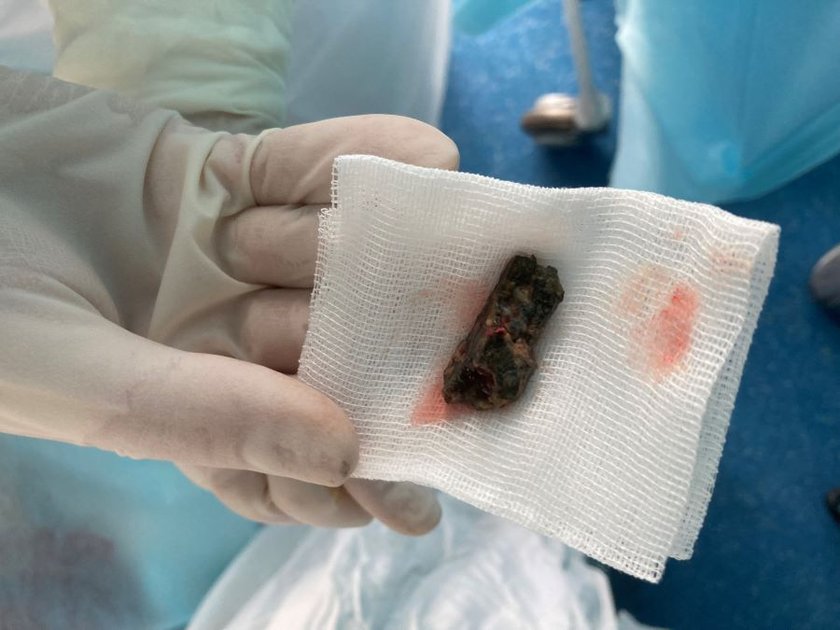An Addenbrooke's consultant who spent three weeks working in a busy hospital in war-torn Ukraine has spoken of the mighty resilience of staff – and the incredible courage of patients.

Dr Rokas Tamosauskas, a specialist in anaesthesia and pain medicine, was struck by the efforts of colleagues who worked relentlessly to treat the war casualties, who in turn were determined to fight another day.
Here, in his own words, is his story as patients arrived relentlessly at a district general hospital in Central-Eastern Ukraine…
"I worked as an anaesthetist in theatres and treated exclusively the casualties of war. These were people who had suffered shrapnel, gunshot, blast wounds and burns. The numbers were depressingly high, up to 15-20 cases in just two trauma theatres per 24 hours.
"Other members of the team were helping as trauma surgeons, general, and urology surgeons, anaesthetic theatre practitioners, and ward nurses. The nurses deserve medals for their relentless 24/7 shift work pattern, re-dressing wounds, administering medications, analgesia, and cheering up patients along the way.

Both staff and patients were exceptionally resilient, understanding, and determined to get better and to win this war. Staff were very professional, stoic and inventive. With limited resources, they achieved incredible results.
Dr Rokas Tamosauskas
"They were noticeably tired, having worked seven days a week, with no prospect of annual or study leave on the horizon. However, resilience, high spirits, and humour were great to see during my day-to-day interactions with staff.
"Although I have worked at Addenbrooke’s for more than 15 years, I am proud to be a Lithuanian national and follow issues related to health in Lithuania closely. This is how I learned about volunteering in Ukraine.

"Following an application, I was selected from more than 300 volunteer medics by the Lithuanian Government’s Ministry of Health to provide aid to our Ukrainian colleagues.
"Twenty-four of us made up the Lithuanian Humanitarian Medical Aid Team, which once in Ukraine was split into two to work in different hospitals. I was chosen to lead one team, and before I left the UK I raised funds and collected medical supplies to take with us to Ukraine. Just through the Lithuanian Anaesthesia and Intensive Care Society we have raised £100,000 worth of goods and delivered a considerable amount of medical supplies to several hospitals in Ukraine. The Lithuanian Government has organised and sent a lorry fully loaded with 21 tonnes of medicines and equipment.
"My high point was simply being able to help Ukrainian colleagues. We were able to cover two theatres in our hospital for three weeks. Ukrainian surgical and anaesthetic teams were allowed to have some rest, spend time with their families, and recover.
It was incredibly moving to see staff and patients cry with emotion because we understood their struggle and sacrificed home comforts, and safety, to help in their war-torn country.
Dr Rokas Tamosauskas

"Our colleagues in Ukraine showed remarkable bravery, stoicism, and professionalism, in the face of a brutal adversity. They really appreciate help that reaches them in many different ways. It is imperative for me to continue sending messages of support, and encouragement, to show my faith in their work, and in a bigger cause, so they never feel alone or abandoned in their struggle.
"Strangely enough, my lowest point came when we first arrived. The initial plan was to work in Kyiv, but by the time we arrived there was little work for us. The invaders had been pushed back and the surge in casualties that Kyiv had seen earlier was, at least, temporarily over. So, we got in touch with the Ministry of Health in Ukraine, and that’s how we ended up making a dash to hospitals in Central Eastern and Central Ukraine.

I will not forget what I saw in and around in Kyiv. We witnessed the aftermath of fighting while entering via the Irpin river valley and the outskirts of town of Makaryv on Kyiv’s western side. There were lots of burnt-out tanks and other military machinery on the roadside, and an infamous motorway bridge across the river Irpin had been blown up.
Dr Rokas Tamosauskas
"There were burnt-out houses and industrial/storage areas along the motorway west of Kyiv. We counted ourselves lucky that we only witnessed one episode of actual fighting.
An anti-missile defence system suddenly, and noisily, intercepted and exploded six Russian rockets in the air. And that’s where we were staying the night.
Dr Rokas Tamosauskas

"Colleagues ask, will I go back? Of course, I would! There is a lot of work left to do in the hospital that I worked at. There are more casualties of war being admitted that need care and treatment. Talking to my colleagues and new friends in Ukraine, I am concerned that the workload has increased in the last weeks since our group left. Unfortunately, I used my annual leave to go to Ukraine and there isn’t much left at the moment. However, I can see there would be a lot of value in helping to arrange a shipment, or even shipments, of disposable vacuum (VAC) dressings and other medical and anaesthesia equipment. Certainly, this won’t be my last time in Ukraine.”
To find out more and to help see https://www.gov.uk/government/news/ukraine-what-you-can-do-to-help (opens in a new tab) and Cambridge Global Health Partnerships https://cambridgeghp.org/
- Dr Rokas Tamosauskas , a 50-year-old father of three, is a fully trained in anaesthesia and pain management and is a Fellow of Interventional Pain Practice (FIPP) of the World Institute of Pain since 2005. He has led Addenbrooke’s Pain Team since 2017. His main clinical interests are within hepato-biliary and liver transplantation anaesthesia as well as chronic spinal and neck pain, chronic muscle pain, nerve pain and spinal cord stimulation. He works closely with the transplant surgeons, neurosurgeons, orthopaedic surgeons, rheumatologists, physiotherapists, pain nurses and psychologists.

